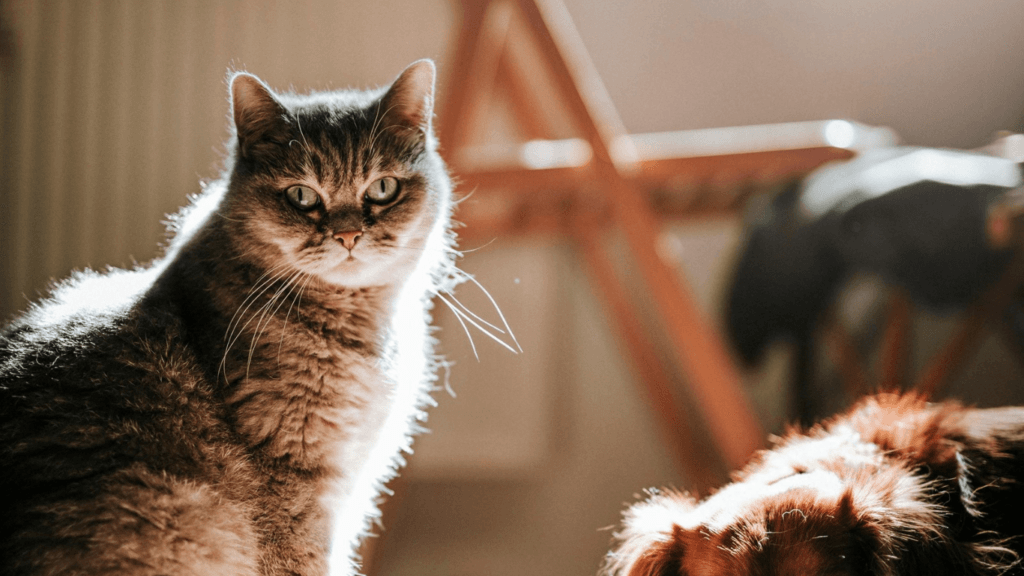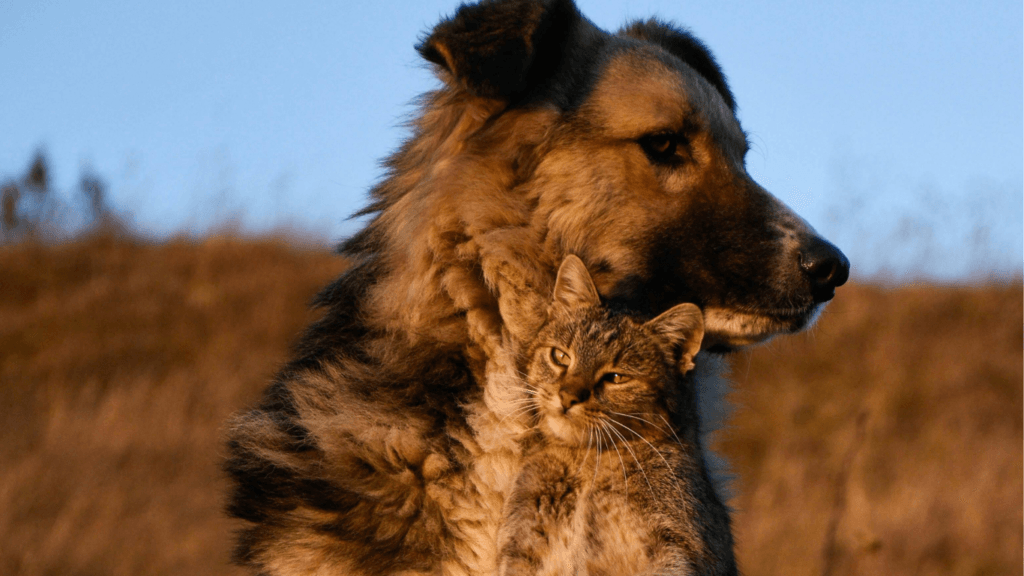Should I get a dog or cat? It’s a tough question that many pet owners struggle with, and the answer isn’t always straightforward. Both dogs and cats bring joy, companionship and lots of love into our lives, but they have very different needs, personalities and lifestyles. Dogs are loyal, energetic and love company, making them perfect for active individuals or families. Cats, on the other hand, are independent, low maintenance and ideal for people with a busy or more relaxed lifestyle.
Understanding Your Lifestyle
Choosing between a dog and a cat depends largely on your lifestyle, personality, and daily routine. Dogs are social, energetic, and thrive on companionship. They require regular exercise, training, and attention, making them ideal for active individuals or families who enjoy outdoor activities and have time to dedicate to their pet. Dogs are loyal and protective, often forming strong bonds with their owners. However, they demand a significant commitment in terms of time, energy, and resources.

On the other hand, cats are more independent and low-maintenance. They are perfect for people with busy schedules or those who prefer a quieter, more relaxed environment. Cats are content with solo play and don’t require daily walks, though they still enjoy affection on their own terms. They are great for smaller living spaces and are generally easier to care for compared to dogs.
Consider your daily routine, living situation, and how much time you can devote to a pet. If you crave constant companionship and don’t mind an active lifestyle, a dog might be the right choice. But if you value independence and prefer a more laid-back pet, a cat could be your perfect match. Ultimately, the decision should align with your lifestyle and the kind of relationship you want with your furry friend.
Dogs: The Loyal Companions
Dogs are often called “man’s best friend” for a reason. They are incredibly loyal, loving, and bring immense joy to their owners. If you’re considering getting a dog, it’s important to weigh the pros and cons to see if they fit your lifestyle.
Pros of Having a Dog
Dogs are highly social animals that thrive on companionship. They are great for active individuals or families who enjoy spending time outdoors. Whether it’s going for walks, playing fetch, or hiking, dogs encourage a healthy and active lifestyle. They are also incredibly protective and can provide a sense of security. Their unwavering loyalty and affection make them wonderful emotional support animals, helping to reduce stress and loneliness.
Cons of Having a Dog
However, owning a dog requires a significant commitment. They need daily exercise, regular grooming, and consistent training. Dogs can also be expensive, with costs for food, veterinary care, and supplies adding up over time. They may not be suitable for people with busy schedules or those who travel frequently, as they require attention and care throughout the day.
Best For: Active Individuals or Families
If you have the time, energy, and resources to dedicate to a dog, they can be an incredibly rewarding addition to your life. They are perfect for those who enjoy an active lifestyle and are looking for a loyal, loving companion.
Cats: The Independent Friends
When it comes to choosing a pet, cats are often the go-to option for those who value independence and low-maintenance companionship. Cats are known for their self-sufficient nature, making them ideal for busy individuals or those who prefer a pet that doesn’t require constant attention.
Pros of Having a Cat
Cats are incredibly clean animals, spending a significant amount of time grooming themselves. They are also quiet, rarely causing disturbances with loud noises. Their independent nature means they don’t need daily walks or constant supervision, making them perfect for people with hectic schedules. Additionally, cats are affectionate in their own way, often forming strong bonds with their owners while still maintaining their autonomy.

Cons of Having a Cat
While cats are low-maintenance, they still require care. Litter boxes need regular cleaning, and some cats can be picky about their food or environment. They may also scratch furniture or exhibit territorial behavior, especially in multi-pet households. Additionally, cats can be aloof at times, which might not suit those seeking a highly interactive pet.
Best For: Busy or Low-Maintenance Pet Owners
If you’re someone with a packed schedule or simply prefer a pet that doesn’t demand constant attention, a cat might be the perfect choice. They offer companionship without the need for intensive care, making them a great fit for modern, fast-paced lifestyles.
Time and Commitment
Bringing a pet into your home is a big decision, and one of the most important factors to consider is the time and commitment required. Both dogs and cats make wonderful companions, but their needs and care levels differ significantly. Understanding these differences will help you decide which pet suits your lifestyle better
Dogs: High Maintenance, High Reward
Dogs are known for their loyalty and affection, but they require a significant amount of time and effort. They need daily walks, playtime, training, and social interaction. Depending on the breed, some dogs require even more exercise and mental stimulation to stay happy and healthy.
Training is another crucial aspect of dog ownership. Puppies need housebreaking, obedience training, and socialization, which can take months of consistent effort. Even adult dogs need ongoing reinforcement of good behaviour. Additionally, dogs require regular grooming, vet visits, and feeding schedules, making them a long-term responsibility.
However, the rewards of having a dog are immense. They offer unconditional love, companionship, and can even improve mental and physical health. If you have the time and energy to invest, a dog can be a deeply fulfilling addition to your life.
Cats: Low Maintenance, Independent
Cats are much more independent than dogs, making them a great choice for busy individuals or those who prefer a low-maintenance pet. Unlike dogs, cats do not require daily walks or extensive training. They are naturally clean animals and use a litter box, eliminating the need for outdoor bathroom breaks.
Cats are content spending time alone, which makes them ideal for people with demanding schedules. They entertain themselves, nap frequently, and require minimal supervision. However, they still need attention, affection, and interactive play to stay happy and mentally stimulated.
Grooming needs for cats vary by breed, but in general, they require less maintenance than dogs. A weekly brushing and occasional nail trimming are usually sufficient.
In this blog, we’ll talk about the advantages, disadvantages and key factors to help you decide Should I get a dog or cat?
Cost Comparison: Dog vs. Cat – Which Fits Your Budget?
When deciding between getting a dog or a cat, understanding the financial commitment is crucial. Both pets bring joy and companionship, but their costs can vary significantly. Let’s break down the expenses to help you make an informed decision.
Initial Costs
The first step is adoption or purchase. Dogs and cats can be adopted from shelters at similar prices, typically ranging from $50 to $200. However, purchasing a specific breed can be more expensive, especially for dogs.
Next, you’ll need supplies. Dogs require items like leashes, collars, crates, and toys, which can add up to $200-$300 initially. Cats, on the other hand, need litter boxes, scratching posts, and toys, costing around $100-$200. Vaccinations and initial vet visits are essential for both, averaging $100-$300 depending on your location and the pet’s needs.
Ongoing Expenses
Food is a recurring cost. Dogs, especially larger breeds, consume more food, costing $20-$60 per month. Cats eat less, averaging $15-$30 monthly. Grooming is another factor. Dogs often require professional grooming, which can cost $30-$90 per session, depending on the breed. Cats are low-maintenance, usually grooming themselves, though occasional brushing or nail trimming may be needed.
Healthcare is a significant ongoing expense. Dogs are prone to more health issues, and routine check-ups, medications, or emergencies can cost hundreds annually. Cats are generally healthier but still need regular vet visits and preventive care. Pet insurance or setting aside a budget for unexpected medical costs is a smart move for both.
In summary, cats tend to be more budget-friendly, with lower initial and ongoing costs. Dogs, while more expensive, offer unique benefits like companionship and outdoor activities. Consider your lifestyle and budget to choose the pet that’s right for you!

Personality Match: Are You a Dog Person or a Cat Person?
Choosing between a dog and a cat isn’t just about preference—it’s about finding a pet that vibes with who you are. Your lifestyle, energy, and even your social habits play a role in whether a wagging tail or a quiet purr will feel like the perfect fit. Let’s break it down.
The Dog Person vs. The Cat Person
Dogs thrive on routine, playtime, and constant companionship. If you’re someone who loves structure, enjoys outdoor adventures, or wants a pet to join your morning runs, a dog might be your soulmate. Dog people often describe themselves as outgoing, active, and eager to connect—traits that align with a pup’s need for engagement and loyalty.
Cats, on the other hand, are masters of independence. They’re low-maintenance companions who value their alone time as much as cozy moments with you. If you’re introverted, work long hours, or crave a pet that respects your personal space, a cat could be your match. Cat lovers tend to appreciate quiet evenings, creative hobbies, and a relationship that’s more “chill roommates” than “24/7 sidekick.”
How to Find Your Perfect Match
Start by asking yourself:
What’s your daily rhythm?
Dogs demand walks, training, and attention. Cats are content with a clean litter box and a sunny windowsill.
How do you recharge?
If social interactions energize you, a dog’s playful nature might complement your vibe. If solitude fuels you, a cat’s calm presence won’t drain your battery.
–
What’s your tolerance for mess?
Dogs track mud, chew shoes, and bark. Cats shed, knock things over, and might ignore you. Which chaos feels more manageable?
Still torn? Consider hybrid traits. Some dogs (like basset hounds) are couch potatoes, and some cats (like Bengals) act like tiny tornadoes. Visit shelters, spend time with breeds, and trust your gut. There’s no “wrong” choice—only what feels right for your unique personality.
At the end of the day, the best pet isn’t the “perfect” one—it’s the one that makes you smile, even when they’re being a little ridiculous.
Family and Social Life: A Key Consideration for Pet Owners
When thinking of bringing a new furry friend into your life, it’s essential to consider how they’ll fit into your family and social dynamics. Both dogs and cats can make wonderful pets, but they have different needs and personalities that can impact your lifestyle.
Dogs: Great for Families and Social Interactions
Dogs are perfect for families and social butterflies! They’re social, friendly, and love spending time with their owners. Dogs are also fantastic with kids, encouraging playtime and learning. Plus, they can help you meet new people and form social connections.
Cats: Ideal for Quiet, Solitary Environments
Cats, on the other hand, thrive in quiet, low-key environments. They’re independent, self-sufficient, and happy to entertain themselves. Cats are purr-fect for those who value their alone time, don’t need constant interaction with their pet, and prefer a more relaxed pace of life.
Remember, choosing the right pet is all about finding the perfect match for your lifestyle and personality!

Long-Term Commitment: Lifespan, Love, and Responsibilities
Deciding between a dog and a cat isn’t just about today—it’s about the next 10–20 years of your life. Both pets bring joy, but their long-term needs vary wildly. Let’s talk lifespan, emotional bonds, and the realities of care to help you choose wisely.
Lifespan: Dogs vs. Cats
Cats often outlive dogs, with many indoor kitties reaching 15–20 years (some even hitting their mid-20s!). Dogs, depending on breed, usually live 8–15 years. Small breeds like Chihuahuas may stick around longer, while larger breeds (e.g., Great Danes) often have shorter lifespans. Ask yourself: Are you ready for a decade-plus commitment? If life changes (career moves, family plans) are likely, a cat’s adaptability or a smaller dog’s portability might fit better.
Emotional Responsibility: More Than Cuddles
Dogs thrive on daily interaction—they’re pack animals who need you to feel secure. Skipping walks or ignoring playtime can lead to anxiety or destructive behavior. Cats are more self-sufficient but still form deep bonds. They’ll need mental stimulation (toys, window perches) and quiet companionship. Both pets grieve loneliness, but dogs demand *active* emotional labor, while cats prefer *consistent* but low-key affection.
Financial Reality: Budget for Paws
Dogs cost more upfront and over time: food (bigger portions), training, grooming, and frequent vet visits (vaccines, flea meds, emergencies). Cats are cheaper but not free: litter, scratching posts, and annual check-ups add up. Unexpected costs? Dogs might swallow a sock ($2,000 surgery), while cats could develop kidney issues (special diets, meds). Pet insurance or a savings fund is smart for either.
The Bottom Line
A dog is like raising a perpetual toddler—rewarding but all-in. A cat is like a quirky roommate—loving but on their terms. Both require time, money, and heart. Choose the one whose long-term needs align with *your* capacity to show up, year after year. After all, it’s not just their life—it’s yours, too. 🐶
Final Thoughts: Making the Right Choice Between a Dog or Cat
So, you’re stuck asking, Should I get a dog or a cat? Let’s cut through the noise. There’s no universal “best” pet—only the one that syncs with your life, quirks, and daily grind. Think of it like choosing a roommate: you want someone (or something) that won’t clash with your vibe. Here’s how to nail the decision without overcomplicating it.
Your Lifestyle is the Ultimate Filter
Dogs are like that enthusiastic friend who drags you on hikes, thrives on routines, and never lets you hit snooze on responsibilities. If your calendar includes morning walks, weekend adventures, and a love for teaching tricks (or cleaning up chew toys), a dog might be your spirit animal. But if your idea of bliss is a quiet evening with a book, a cat’s “come-and-go” affection could feel like heaven. Cats don’t need schedules—they need a cozy lap and a window to birdwatch.
Space Matters (But Not as Much as You Think)
Apartment dweller? Cats often adapt better to small spaces, as long as they’ve got vertical perches and scratching posts. Dogs can thrive in apartments too, but high-energy breeds (looking at you, Border Collies) might go stir-crazy without a yard. That said, lazy breeds like Bulldogs or senior dogs can be couch-friendly companions.
Time: The Deal Breaker
Dogs demand *time*. Training, playtime, vet visits, and grooming add up. If your job has unpredictable hours or you travel often, a cat’s self-reliance might save your sanity. Cats won’t guilt-trip you for working late—they’ll just nap harder. But don’t mistake independence for indifference; they’ll still curl up with you when *they* feel like it.
The Heart of the Matter
Dogs offer unwavering loyalty—they’re your shadow, your cheerleader, your living reminder to seize the day. Cats offer quiet companionship—they’re your zen master, your Netflix buddy, your low-key confidant. Both will steal your heart; it just depends on *how* you want it stolen.
Still torn? Visit a shelter. Spend time with both. See who locks eyes with you or nudges your hand. Sometimes, the choice isn’t about logic—it’s about that inexplicable “click.”
Whether you pick a dog, a cat, or even both (no judgment here!), remember: perfection is overrated. Pets, like humans, are messy, weird, and wonderfully unpredictable. The “right” choice isn’t about avoiding mistakes—it’s about embracing the chaos and letting love grow where it lands.
FAQ
How do you tell if my dog loves me?
Does My Dog Love Me? 10 Clear Signs to Look For
1 The “Welcome Home” Dance
2 Soft Eye Contact
3 Checking In During Walks
4 Licking Your Hands or Face
5 Relaxed Body Language
6 The “Puppy Eyebrow Raise”
7 Sleeping Close to You
8 Bringing You Their Toys
9 Leaning Into You
10
Following You… Everywhere
How long do dogs sleep?
Dogs love their snooze time! On average, most adult dogs sleep around 12–14 hours a day. But this can vary a lot depending on their age, breed, and lifestyle. Puppies and senior dogs tend to nap even more—up to 18–20 hours daily—because growing or aging bodies need extra rest. Active breeds or working dogs might sleep a bit less, while laid-back couch potatoes might clock in more hours. If your dog’s routine suddenly changes (like sleeping way more or seeming restless), it’s worth checking with a vet. Otherwise, catching those Z’s is just part of being a happy, healthy pup!
How long are dogs pregnant?
The length of a dog’s pregnancy, also known as the gestation period, is approximately 58-68 days. However, this can vary depending on the breed and size of the dog.
Here are some general guidelines:
Small breeds (e.g. Chihuahua): 50-60 days
Medium breeds (e.g. Cocker Spaniel): 58-68 days
Large breeds (e.g. Great Dane): 60-70 days
Keep in mind that every dog is different, and the length of pregnancy can vary. If you have any questions or concerns about your dog’s pregnancy, it’s always best to consult with your veterinarian.
Is it better to get a dog or cat?
Choosing between a dog or cat depends on your lifestyle. Dogs thrive with active owners who enjoy daily walks, playtime, and consistent attention. Cats are more independent, ideal for busier folks who prefer low-maintenance companionship. Consider your energy, schedule, and how much interaction you want—both offer unique love, just in different ways!


Let’s make tonight unforgettable… your place or mine? – https://rb.gy/es66fc?Dola
“You’re like an intriguing book I want to read. Shall we begin on https://rb.gy/44z0k7?Dola “